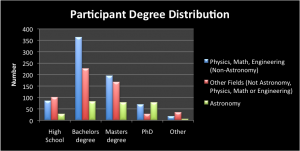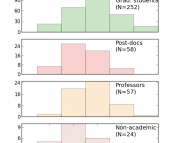A little over a month ago Astrobites posted a link to a Social Perception of Astronomy Survey. This survey was developed by a group of graduate astronomers to investigate how the general public thinks about astronomy and astrophysics and the scientists who specialize in the field. Since then we have had several readers enquire about the results. So here we go:
Motivation:
We work in a field where names and classifications can be confusing. As it turns out, this trend extends not only to objects and phenomena, but also to the name of the field itself. There are at least two terms in common use today: astronomy and astrophysics. Both terms have a lot of history behind them and are obviously connected at a very deep level, but what is that level? Are they the same? Is one broader than the other? Do they describe different things?
I don’t claim to know the answer, but with this ambiguity comes a choice. Imagine this scenario: you sit down on a plane next to a stranger; they turn, introduce themselves, and ask you what you do. What is your response?
Everyone is likely to respond differently and many astronomers I know use the two terms interchangeably. However, in discussing this conundrum, I’ve often heard a the opinion that, “you say astronomy if you want to start a conversation (and take the risk that they will start discussing how the world is going to end when the planets next align) and astrophysics when you want to stun them into silence (‘WOAH…’)”.
Obviously this is a gross simplification, but it reveals the fact that many of believe that we are perceived differently by the general public when we identify as ‘astronomers’ versus ‘astrophysicists’. Is this belief borne out in reality, though? Do people actually react to the two words differently? It is these questions that this survey attempted to assess.
Disclaimers:
(1) What I present below is NOT a rigorous statistical analysis. I was given access to the raw data for the purpose of writing this post. As a first glance I simply examine the percentage of people who respond a certain way and how that varies when various filters are applied (i.e. people who don’t personally know anyone in astronomy, people with a college degree in the physical sciences, etc.). An actual paper with a detailed analysis of this data is in the works. What I give here is simply meant as a sneak peak into some initial trends present in the results to suggest where interesting avenues of further investigations may lie. (Translation: Don’t sue me for my plots).
(2) This is a survey of perceptions; there are no ‘right’ or ‘wrong’ answers.
Who took the Survey:
In the month that the survey was open there were approximately 1630 responses. These came from people of all ages and all parts of the world. Of these, 17% identified themselves as an astronomer/astrophysicist and 33% said that they have a close friendship with someone in astronomy/astrophysics. The remaining 50% of respondents fit into neither of these two categories; I refer to them below as the ‘general public’.
Of the participants not directly associated with astronomy/astrophysics 54% have at least a partial background in physics, math or engineering and 46% identify themselves with some other field. The participants also have a wide range of educational backgrounds. Figure 1 shows the distribution of ‘highest degree achieved’ for various subsets of participants.
Results: Are the Two Different?
All right, congratulations, you’ve stuck with me for this long. Let’s get down to it. The logical place to start is with a simple, but loaded, question: Do people think that astronomy and astrophysics are different? Participants were asked to rank how strongly they agreed or disagreed with the following statement: ‘Astronomy is different from Astrophysics’. Figure 2 shows some of the results. The colors in the left panel represent different subsets of participants defined by either who they know, or what they fields they studied. In the right panel, different colors represent people with different levels of formal education (the astronomers are plotted separately). In all cases the vertical axis is the percentage of that subset which responded in a certain way.
We see that, in general, people do feel that there is a difference between the terms ‘astronomy’ and ‘astrophysics’; with over 70% of non-astronomers perceiving a distinction (>90% of those who gave an opinion!). Tellingly, the only groups that appear divided on the issue are those who study astronomy/astrophysics (PhD’s: 46% strongly agree/agree, 48% strongly disagree/disagree, Bachelor/Master’s: 51% strongly agree/agree, 29% strongly disagree/disagree). This suggests a significant difference in perception between people ‘within the field’ and the general public. Intriguingly, the group most likely to strongly agree with this statement is that made of of participants with PhDs in fields other than astronomy/astrophysics.
Results: Hard vs. Soft Science?
Participants were asked to rank both astronomy and astrophysics on a scale from 1 to 5 where 1 represents a ‘soft’ science and 5 a ‘hard’ science. There were actually two versions of this survey; one version had participants rank astronomy at the beginning and astrophysics halfway through, while in the second version the order was reversed. Figure 3 below presents the results only from participants who ranked a given discipline first, as we felt this represented the most unbiased result. We see that, on average, astrophysics is ranked as a ‘harder’ science than astronomy. If we include the rest of the responses, we find that this result becomes noticeably more extreme, suggesting that opinions may have hardened/intensified as participants worked through the survey.
Results: Who Would You Hire?
A series of questions in this survey were meant to assess what real-world consequences (other than the tone of your airplane conversations) any public perception of astronomy/astrophysics could create. Specifically, if you choose to look for employment outside of academia, does your chosen ‘label’ affect what jobs others feel you are qualified for? Throughout the survey, participants were asked a number of questions of the form, “If you were hiring for X you would prefer X”. Three of these are presented in figure 4 below.
From this we see that our participants are divided. In each case, a significant number don’t feel that there is a distinction between the astronomy/astrophysics in terms of job qualification, but a significant number is not all. If we restrict ourselves to participants with college degrees outside of astronomy (meant to attempt to represent individuals who may be in charge of hiring for these positions), 30% feel astrophysicists are more qualified as high school teachers, 39 % feel astrophysicists are more qualified for jobs in finance, and 47% even feel that astrophysicists are distinctly more qualified for jobs as NASA. These should be compared to the 53%, 24% and 47% who felt astronomers and astrophysicists are equally qualified for those respective jobs, and only 8%, 3% and 5% who feel astronomers are distinctly more qualified than astrophysicists.
A Few Final Thoughts:
This is really only the tip of the iceberg where this question is concerned. There much more information in this survey, many more ways to filter the data, and many issues the survey did not even address (i.e. does the general public think astronomy is broader?). However, these preliminary results do seem to indicate that people outside the field view astronomy and astrophysics differently.
Throughout this entire process I couldn’t help but be reminded of the Pluto controversy of about five years ago. My reaction at that time was simple: I didn’t really care. To me, whether or not Pluto was a planet was a name, a designation, nothing more. It doesn’t change what that body has to offer as far as unraveling the mysteries of the universe. Similarly, what someone chooses to call themselves does not change who they are, what they have already accomplished, and what they are capable of doing next – the very things I think job hiring should actually be based on.
However, not everyone agrees with me about Pluto, and I know that is not always how the real world works. People are busy; often times initial perceptions and snap judgments can matter. This doesn’t mean that either term is more fundamentally correct: I think everyone should of course choose which term that they identify with. It just suggests that if you choose to leave the cozy confines of the ivory tower of academia, the choice you make may affect how you’re perceived by others.
I hope you have enjoyed this musing on my part and I hope it sparks some fun conversations. Also, if you have any ideas for interesting ways to filter this data, please leave a comment.






I’m sure there are exceptions, but look at it this way: If you’re an astrophysicist, you’re also an astronomer, but if you’re an astronomer, you’re not necessarily an astrophysicist — you might be a geologist who studies the Moon or Mars, or you might be a biologist who studies organic molecules in space. More to the point, you might be an amateur astronomer (there are a lot more amateur astronomers than professional astronomers); and have you ever heard of an amateur astrophysicist?
Thanks for posting the results in such an easy to consume manner! I’ve always thought as astronomers being observational while astrophysicists being more theoretical in their approach.
Very interesting study. I think there is a distinction, but someone with no real training would not be able to tell. I believe the hypothetical airplane situtation is very accurate and indicative of scenarios we are commonly in.
Doing a paper on this very thing. Potaytoh, potahtoh…Isn’t one a branch of the other. You must admit being called a an “astro-physicist” raises some eyebrows, and unfortunately, “astronomers” get confused with your local weatherman. Now, thats the real world.
Must say though, interesting results to the survey. Keep looking up.